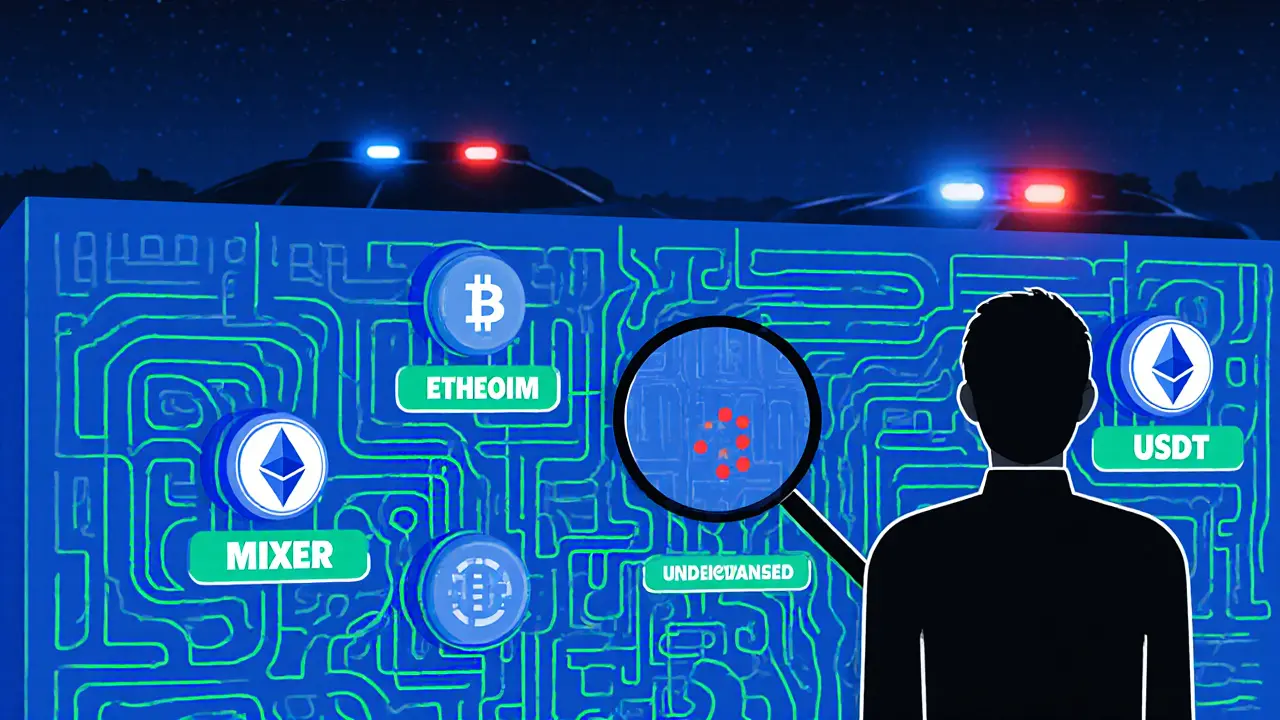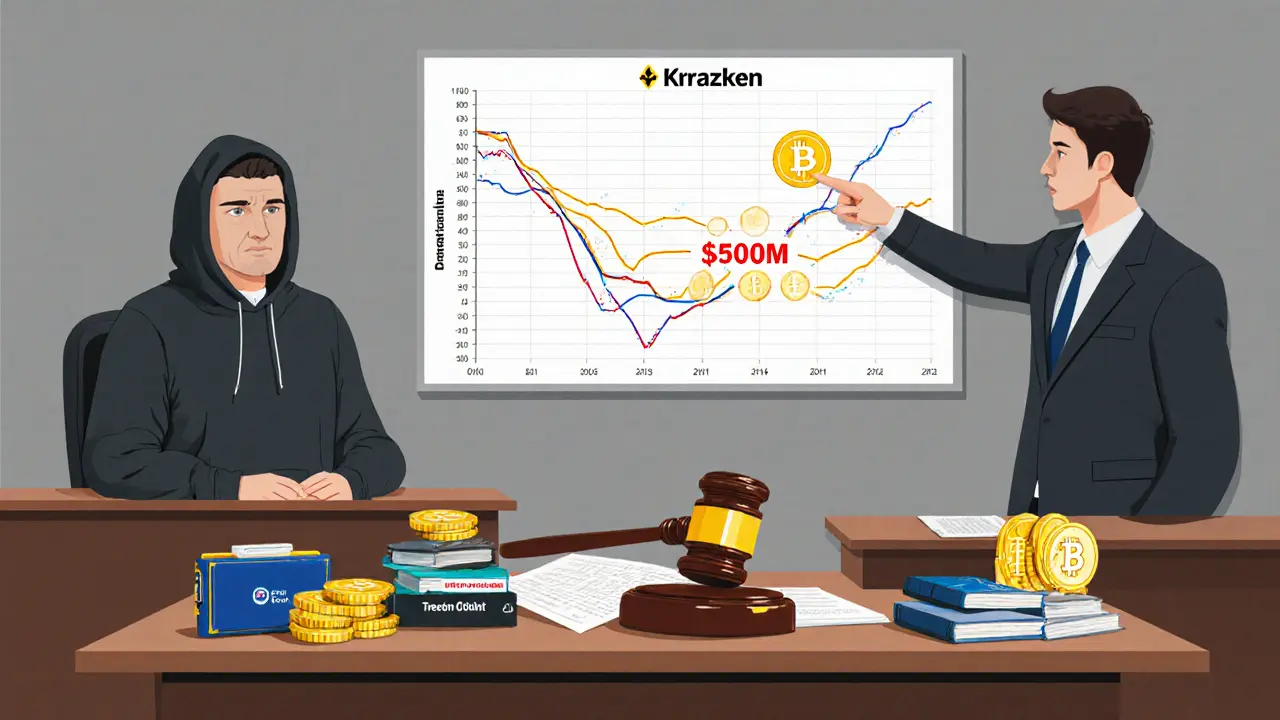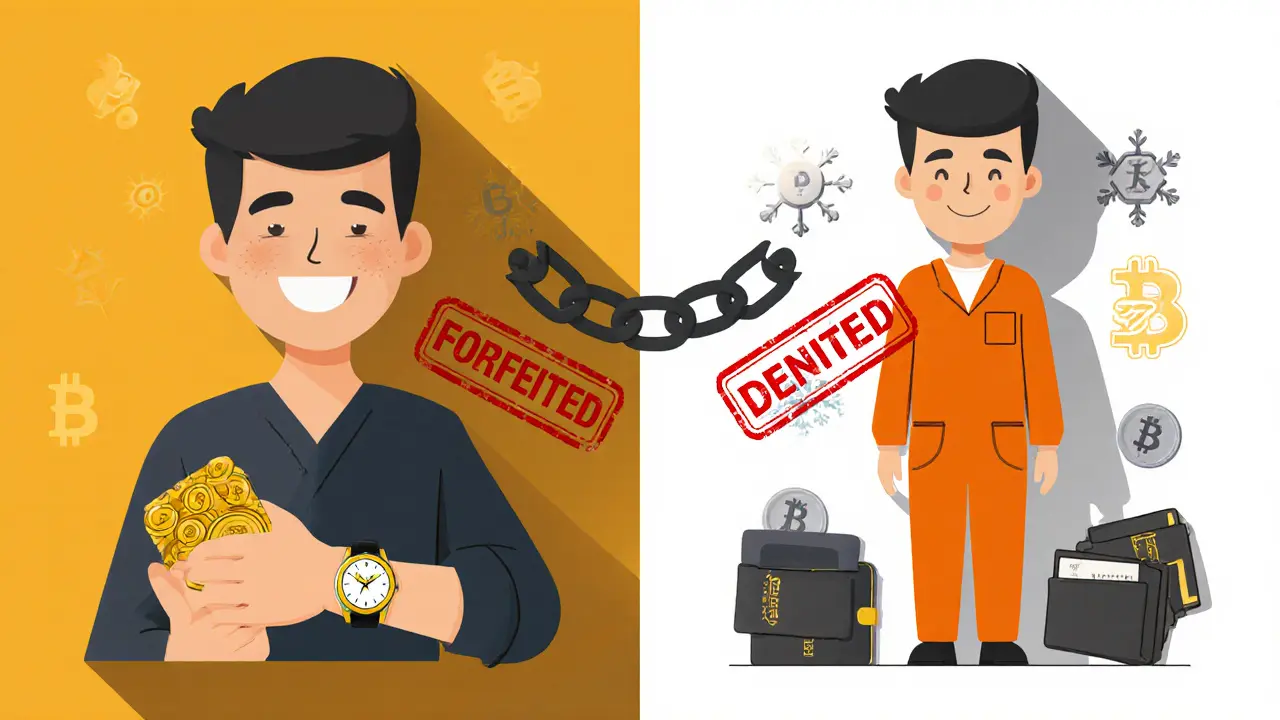
Crypto Money Laundering Risk Assessment Tool
Assess Your Risk
This tool estimates your potential legal risk of facing money laundering charges based on your crypto activities. The calculator is based on information from U.S. federal law and recent enforcement cases.
When you hear money laundering charges for crypto, the first thing that comes to mind might be a Hollywood scene: dark rooms, encrypted wallets, and a judge slapping down a 20-year sentence. But the reality is messier, more complex, and far more dangerous than the movies suggest. You won’t get 20 years just for moving Bitcoin through a mixer. But if you’re running a large-scale operation-processing millions in stolen funds, hiding transactions across borders, and ignoring anti-money laundering rules-you could easily be looking at that kind of time.
How Crypto Money Laundering Actually Works
Crypto isn’t magic. It’s just digital cash with a public ledger. Every transaction is recorded on the blockchain. That sounds like a security feature, but criminals have turned it into a puzzle they think they can solve. They use mixers, tumblers, and cross-chain bridges to break the trail. They move stolen coins from Bitcoin to Ethereum, then to TRON, then into stablecoins like USDT, and finally out through exchanges in countries with weak oversight. In 2025, over $2.17 billion was stolen from crypto platforms in just the first six months. That’s more than the entire year of 2024. And it’s not just hackers-organized crime groups are now running crypto laundering as a business. They hire blockchain analysts to cover their tracks, use fake IDs to open exchange accounts, and set up shell companies in places like the Czech Republic or Panama to move money without raising red flags. One case from early 2025 showed how sophisticated this has become. A dormant Bitcoin wallet, linked to a darknet marketplace called Nucleus, suddenly woke up. Over two days, it moved 0.468 BTC to a Trezor hardware wallet, then split 468 BTC into four separate transfers, and added another 151 BTC. All of it was routed through Kraken and other exchanges. The goal? To make it look like these were legitimate trades from real users-not stolen funds.The Laws That Can Put You in Prison
In the U.S., crypto money laundering isn’t a new crime. It’s charged under existing laws: 18 U.S.C. § 1956 (money laundering) and § 1957 (monetary transactions in property derived from unlawful activity). But there’s also the Bank Secrecy Act, which requires businesses that handle money-like crypto exchanges-to report suspicious activity. If you run a service that converts crypto to cash without a license, you’re breaking the law, even if you didn’t steal the money yourself. The maximum sentence for a single count of money laundering under federal law is 20 years. But that’s not automatic. It’s the ceiling, not the starting point. Judges don’t hand out 20-year sentences like traffic tickets. They look at the amount of money, how long the operation ran, whether it involved drugs or terrorism, and if the person tried to hide evidence or flee the country. Take Kais Mohammad, who operated under the alias “Superman29.” Between 2014 and 2019, he ran a Bitcoin-to-cash kiosk network that moved $25 million. He charged up to 25% in fees-way above market rates. He didn’t have a license. He didn’t keep records. He didn’t report suspicious transactions. He got 24 months in prison. That’s two years. Not 20. Why? Because he cooperated, pleaded guilty, and his operation, while large, wasn’t tied to drugs or violence. Now imagine someone who moved $500 million in stolen funds over five years, used the money to buy real estate in multiple countries, and refused to testify against their associates. That’s a different story. That’s where 20 years becomes real.
Why Stablecoins Are the New Weapon of Choice
Bitcoin used to be the go-to for laundering. But it’s too slow. Too traceable. Today, criminals are shifting to stablecoins-especially Tether (USDT). Why? Because USDT moves faster, costs less to transfer, and is often treated like cash by exchanges. You can send $10 million in USDT across borders in minutes. No bank holds it. No regulator tracks it in real time. Tether, the company behind USDT, reportedly has fewer than 10 investigators for over 20 million accounts. That’s one person for every two million users. It’s impossible to monitor everything. So criminals exploit the gaps. They use decentralized exchanges, peer-to-peer trades, and non-KYC platforms to convert stolen crypto into USDT, then cash out through local agents in countries with no reporting rules. The EU’s Anti-Money Laundering Authority calls cross-border crypto laundering the “top emerging threat.” Why? Because once money crosses into a jurisdiction with weak enforcement, it’s gone. You can’t freeze an account in a country that doesn’t recognize your warrant. You can’t subpoena a server that’s hosted in a bunker in the mountains of Georgia.What Happens When the Feds Come Knocking
If you’re suspected of crypto money laundering, the Feds don’t show up with a warrant and a badge. They start with blockchain analysis. Companies like TRM Labs and Chainalysis track every transaction. They don’t need your password. They just need your wallet address. If your wallet received funds from a darknet marketplace, or sent money to a mixer, or moved cash out through an unlicensed exchange-boom. You’re on their radar. Once they have your digital footprint, they start connecting dots. Did you use the same IP address as a known operator? Did you transfer funds to a wallet linked to a sanctions violation? Did you buy luxury goods with crypto that was stolen from a hack? Each link adds to the case. Defense lawyers fight back by arguing the blockchain evidence is circumstantial. “Just because the money came from a hack doesn’t mean I knew it was stolen,” they say. Or, “I was just a technician. I didn’t control the funds.” But judges are getting smarter. In 2024, a federal court in New York ruled that ignorance isn’t a defense if the defendant had “willful blindness”-meaning they didn’t ask questions because they didn’t want to know.
The Real Risk Isn’t Just Jail-It’s Your Entire Life
A 20-year sentence sounds extreme. But the real punishment is what comes after. Once convicted, you’re labeled a financial criminal. You can’t get a job. You can’t open a bank account. You can’t travel to most countries. Your crypto wallets are frozen. Your assets are seized. Even if you serve your time, you’re permanently marked. And it’s not just you. Family members who helped-by holding wallets, transferring funds, or even just giving you a place to stay-can be charged as accessories. The government doesn’t care if you’re a “good guy” who got sucked in. If you touched the money, you’re part of the scheme. The biggest mistake people make? Thinking they’re invisible. “No one can trace crypto,” they say. But the truth is, the Feds don’t need to trace every coin. They just need to trace one. One transaction. One exchange. One IP address. One mistake.What You Should Do If You’re Worried
If you’ve ever moved crypto through an unlicensed exchange, used a mixer, or accepted funds from someone you didn’t know, you’re not alone. But you’re not safe. The government’s focus on crypto laundering is growing. In 2025, they’re going after not just the big players-but the middlemen, the operators, the “innocent” users who thought they were just helping out. Here’s what to do:- If you’re running a crypto business, get licensed. Period. No excuses.
- If you’re using mixers or tumblers, stop. They’re red flags, not protections.
- If you received crypto from someone shady, don’t move it. Document everything and consult a lawyer.
- If you’re unsure whether a transaction is legal, assume it’s not.
Can you really get 20 years in prison for crypto money laundering?
Yes, but not for small or isolated cases. The 20-year maximum applies under federal law for aggravated money laundering-especially when combined with other charges like operating an unlicensed business, drug trafficking, or international conspiracy. Most first-time offenders get far less, but the risk increases dramatically with the scale of the operation. A $25 million case got 24 months. A $500 million case could easily trigger the 20-year maximum.
Do you need to steal crypto to be charged with money laundering?
No. You can be charged even if you didn’t steal the money yourself. If you knowingly processed stolen funds-by converting crypto to cash, moving it through exchanges, or helping someone hide it-you can be charged as a money launderer. The law targets the act of concealing or transferring illicit funds, regardless of who stole them.
Is using a crypto mixer illegal?
Using a mixer isn’t automatically illegal, but it’s a major red flag for law enforcement. Mixers are designed to obscure the origin of funds, which is exactly what money launderers need. If you use one and the funds you’re mixing are tied to a crime, prosecutors will argue you knew or should have known. Even if you claim you were just protecting privacy, courts often see this as willful blindness.
Can the government track crypto even if it’s on a decentralized exchange?
Yes. Decentralized exchanges (DEXs) don’t require KYC, but they still run on public blockchains. Every transaction is visible. Law enforcement uses blockchain analytics tools to trace flows from known criminal addresses to DEXs and back out to centralized exchanges. Once the funds hit a regulated exchange, they can freeze accounts and subpoena records. You can’t hide on a public ledger.
What happens to your crypto if you’re convicted?
All crypto tied to the crime is subject to asset forfeiture. That means the government can seize your wallets, even if they’re in your name or held by a third party. This includes hardware wallets, exchange accounts, and even crypto held in smart contracts. Once seized, it’s sold off and the proceeds go to law enforcement funds.
Are crypto exchanges helping or hindering law enforcement?
Most major exchanges now cooperate with regulators and provide transaction data when legally required. But many smaller or offshore platforms have minimal compliance teams. Tether, for example, has only a handful of investigators for millions of users. This creates blind spots criminals exploit-but also means that when law enforcement does get access, they get powerful evidence. The trend is toward tighter controls, not looser ones.
Is crypto money laundering more common now than in the past?
Yes. In 2025, over $2.17 billion was stolen from crypto platforms in just the first half of the year-more than all of 2024. The speed and scale have exploded. Criminals are now using stablecoins like USDT for faster, harder-to-trace transfers. The volume of illicit crypto flows is projected to hit $51 billion in 2025, up from $35 billion in 2024. Law enforcement is responding with new tools and tougher penalties.
Can you avoid prison if you cooperate with authorities?
Yes. Cooperation is one of the biggest factors in sentencing. If you provide information that helps shut down a larger operation, identify other criminals, or recover stolen funds, prosecutors may reduce your charges or recommend a lighter sentence. In the Kais Mohammad case, his cooperation led to a 24-month sentence instead of a longer one.
Ali Korkor
28 10 25 / 15:06 PMJust remember: if you didn't ask questions, you're not innocent. Crypto ain't magic, it's just money with extra steps. Stay smart.
John Murphy
30 10 25 / 09:37 AMI've seen people get wrecked over small stuff just because they didn't know the rules
Not saying you did anything wrong but if you're even a little unsure, talk to someone before moving anything
Dick Lane
31 10 25 / 15:27 PMThey don't need your password
They just need one bad transaction
One mixer
One sketchy exchange
And boom you're on their list
Chloe Jobson
1 11 25 / 21:38 PMStablecoins are the new cash
USDT moves faster than banks
And the compliance teams are stretched thinner than ever
It's not about anonymity-it's about scale and speed
Akinyemi Akindele Winner
3 11 25 / 07:01 AMMan this whole thing is a circus
They call it laundering but half these folks just wanna move money without Uncle Sam peekin' over their shoulder
Meanwhile the real crooks? They got lawyers, offshore trusts, and a private island
Meanwhile I'm gettin' flagged for using a mixer to send my pizza money
MANGESH NEEL
4 11 25 / 17:29 PMAnyone who still thinks crypto is anonymous is either braindead or deliberately lying to themselves
Chainalysis has more data on your wallet than your ex has on your Tinder history
You think you're slick using a DEX? Nah
You're just the low-hanging fruit they use to justify their next budget increase
And don't even get me started on the 'I didn't know' defense
That's the same excuse used by guys who stole their neighbor's Wi-Fi and then cried when the cops showed up
Jonathan Tanguay
5 11 25 / 10:11 AMLet me break this down for the confused masses
Money laundering isn't about stealing crypto it's about making stolen crypto look clean
And the law doesn't care if you're a nice guy who just got caught in the crossfire
Willful blindness is a legal term not a personality trait
And if you used a mixer even once you're already on the radar
Not because you're evil but because you were stupid enough to think it was safe
And now you're gonna pay for it with your freedom your assets and your reputation
And don't even think about blaming the government
They warned you
They've been warning you for years
And you still clicked 'confirm' without reading the fine print
That's not a crime of passion
That's a crime of negligence
madhu belavadi
6 11 25 / 11:07 AMI lost my entire portfolio last year because I trusted someone who said they could 'clean' my coins
Now I can't even open a bank account
My wife won't talk to me
I sleep on my cousin's couch
And I still don't know if I did anything wrong
Or if I was just too dumb to see it coming
Roxanne Maxwell
6 11 25 / 12:35 PMIt’s wild how much fear there is around this topic
But honestly? Most people who get caught aren’t evil
They’re just confused
They thought mixing was like a VPN for money
And now they’re terrified
And honestly? I get it
Don’t panic
But do get help
Don’t wait until they knock on your door
Norman Woo
6 11 25 / 22:01 PMtheyre all in on it
chainalysis is a gov tool
the exchanges are shills
the stablecoins are rigged
and the whole thing is just a way to track us
you think they care about crime?
they care about control
your wallet is your soul now
and they want to own it
Sean Huang
7 11 25 / 21:17 PMDid you know that the FBI uses AI to predict which wallets will be used for laundering before the transaction even happens?
They don't need evidence they need patterns
And your behavior-how often you move coins, which wallets you interact with, even the time of day-you're being scored
They don't need to prove you stole anything
They just need to prove you're suspicious
And once you're on the list you're guilty until proven innocent
And the system doesn't care if you're innocent
It only cares if you're predictable
And if you're reading this
you're already on the list
Andrew Morgan
8 11 25 / 15:44 PMLook I used to think mixers were just for privacy
Then I saw what happened to a guy in my Discord group
He just sent a few thousand through a mixer
Didn't know where it came from
Didn't care
Two months later his house got seized
His car got repossessed
And his dog got taken by animal control because his wife left him
It wasn't about the money
It was about the precedent
So now I just keep it in cold storage
And I don't touch anything unless I know exactly where it came from
It's not freedom if you lose everything for it
James Young
10 11 25 / 13:05 PMYou people are so naive
It's not about whether you knew it was stolen
It's about whether you were dumb enough to touch it
There's no gray area anymore
If you didn't verify the source you're complicit
And if you're still using mixers you're begging for trouble
Stop acting like you're some underground hacker
You're just a walking compliance violation with a Ledger
Michael Folorunsho
10 11 25 / 21:21 PMAmericans think they're special because they use crypto
But the truth? The rest of the world sees you as the reckless kids playing with fire
And now you're getting burned
And you wonder why the EU is tightening regulations?
Because you made it necessary
Stop crying about privacy
Start acting like an adult
Or get left behind
Zach Crandall
11 11 25 / 00:04 AMIt is not merely a question of legal compliance-it is a profound ethical reckoning with the very architecture of financial autonomy
One cannot simultaneously invoke the sanctity of decentralized finance while engaging in practices that undermine the foundational principles of transparency and accountability
One must ask oneself: if the blockchain is a public ledger, then is obfuscation not a betrayal of its covenant?
And if one's intent is not criminal, then why the necessity of obfuscation?
One cannot plead ignorance when the tools one employs are explicitly designed to evade detection
One is not a victim of overreach-one is a participant in a system that has long warned of its consequences
And now, the bill has come due
And it is payable not in Bitcoin, but in liberty